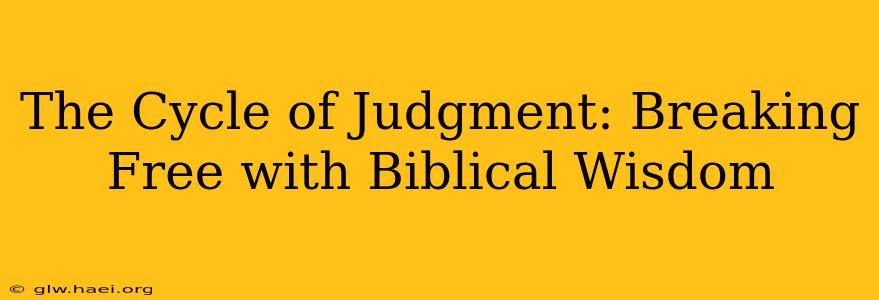The Cycle of Judgment: Breaking Free with Biblical Wisdom
Have you ever felt trapped in a relentless cycle of negative judgment – of yourself or others? A spiral of harsh self-criticism, quick condemnation of others, or a constant feeling of being judged? This isn't just a personal struggle; it's a common human experience. But the Bible offers a powerful path to breaking free from this cycle, replacing judgment with grace, understanding, and ultimately, freedom.
This journey begins with understanding the nature of judgment itself. It's not merely about pointing out flaws; it's a deeply rooted spiritual condition that affects our relationships with God, ourselves, and others. The Bible speaks extensively about the dangers of judgment and the liberating power of forgiveness and mercy. Let's explore this journey together, drawing upon biblical wisdom to find our way to a more peaceful and compassionate life.
What does the Bible say about judging others?
This is a fundamental question at the heart of understanding the cycle of judgment. Jesus himself addresses this directly in Matthew 7:1-5: "Judge not, that you be not judged. For with the judgment you pronounce you will be judged, and with the measure you use it will be measured to you. Why do you see the speck that is in your brother's eye, but do not notice the log that is in your own eye? Or how can you say to your brother, ‘Let me take the speck out of your eye,’ when there is the log in your own eye? You hypocrite, first take the log out of your own eye, and then you will see clearly to take the speck out of your brother's eye."
This passage isn't about ignoring wrongdoing. It's about recognizing our own flaws and hypocrisy before attempting to judge others. It's a call to humility and self-awareness, urging us to focus on our own hearts before condemning those of others. The log represents our own significant failings, while the speck represents the minor flaws we see in others. We must address our own "logs" before attempting to remove others' "specks."
How can I stop judging myself so harshly?
Self-judgment is often the most insidious form of this cycle. It can lead to depression, anxiety, and a crippling sense of inadequacy. The Bible offers a powerful antidote: God's unconditional love and grace. Romans 8:1 reminds us, "There is therefore now no condemnation for those who are in Christ Jesus." This isn't a license for sin, but a declaration of freedom from the relentless condemnation of our own mistakes.
To break free from harsh self-judgment, we need to cultivate a mindset of self-compassion. This means treating ourselves with the same kindness and understanding we would offer a friend struggling with similar challenges. It's about acknowledging our imperfections while recognizing our inherent worth as children of God. Remembering God's love and forgiveness is crucial in this process. Practice self-forgiveness and focus on your strengths and positive qualities, rather than dwelling on your perceived failures.
How can I forgive those who have hurt me?
Forgiveness is a cornerstone of breaking the cycle of judgment. It doesn't mean condoning the actions of others; it means releasing the bitterness and resentment that bind us to the past. The Bible emphasizes the importance of forgiveness repeatedly, as in Ephesians 4:32: "Be kind and compassionate to one another, forgiving each other, just as in Christ God forgave you."
Forgiving someone who has hurt you is a process, not a single event. It requires humility, empathy, and a willingness to let go of the anger and pain. It may involve seeking professional help or spiritual guidance. Remember, forgiveness is primarily for your own benefit – releasing you from the burden of anger and resentment so you can move forward with healing and peace.
Is it ever okay to judge?
While we're called to avoid judgmental attitudes and actions, discernment is different. The Bible encourages us to be wise and discerning, to distinguish between right and wrong. 1 Corinthians 5:12-13 speaks about judging those within the church, emphasizing the importance of addressing sin within the community. This kind of judgment is not condemnation, but a loving act of correction and restoration. The key difference lies in the motive and approach. Discernment is motivated by love and seeks restoration, whereas judgment is often rooted in pride and condemnation.
Breaking free from the cycle of judgment is a journey, not a destination. It requires consistent effort, self-awareness, and reliance on God's grace. By embracing biblical wisdom, cultivating self-compassion, and practicing forgiveness, we can replace judgment with love, understanding, and true freedom.

